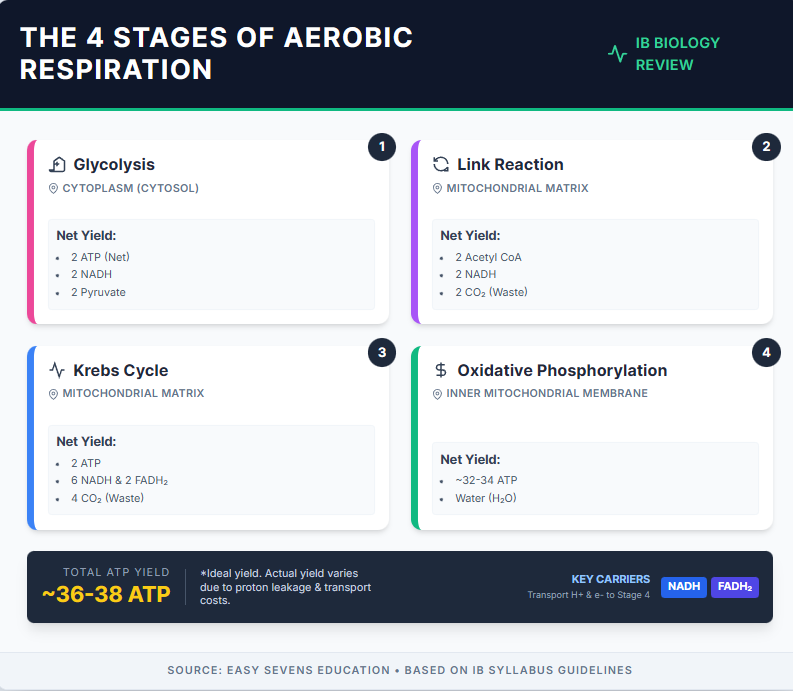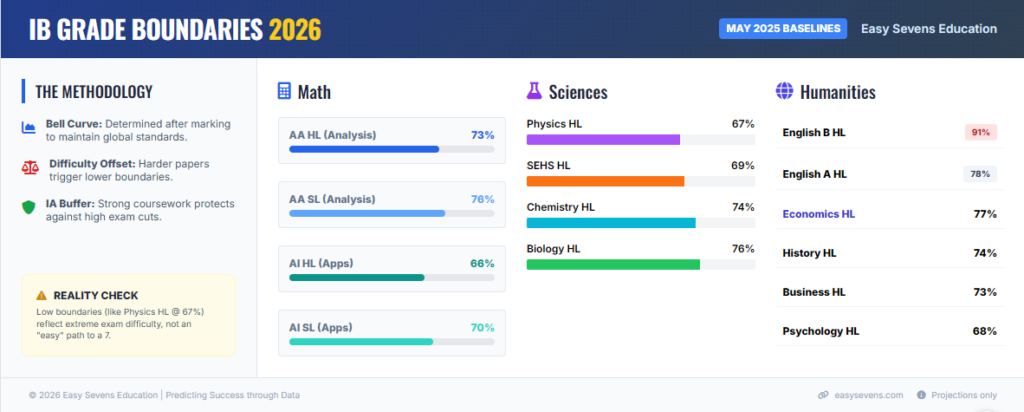If you’re someone who is familiar with the DP Biology curriculum from 2014 for exams between 2016 and 2023, you may have noticed that the new IB Biology 2023 syllabus has undergone some significant changes. One of the most striking changes is the layout of the content, which aims to promote a more conceptual understanding of Biology. The guide is designed to support teaching approaches that help students discover the links between topics and connect their learning to overarching concepts in Biology. While these ideas are not new, the updated guide’s appearance and the titles of its topics are. However, don’t be alarmed because much of the Biology content remains familiar, and the changes are meant to make the guide more useful and effective. Our IB Biology tutor here at Easy Sevens is fully prepared to help any IB students with the new biology syllabus.
In addition to the changes in layout and approach, there is also an updated IB sciences experimentation guide that provides specific guidance for conducting microbiology experiments, ecology fieldwork, risk assessment, disposal of waste, and animal experimentation and dissections. The updated guide acknowledges that certain animal experiments, such as choice chambers, can be conducted ethically by following specific guidelines. These changes are intended to provide teachers with more resources and options for teaching Biology in innovative and engaging ways.
New IB Biology 2023 External Assessments
Assessment Objectives
The IB Biology syllabus for 2023 retains the four assessment objectives, but the wording of each objective has changed slightly. However, there are no major changes to the objectives, and the command terms used in exams remain the same. Students are expected to have a general understanding of the nature of science.
Exam Papers
The IB Biology exam papers for 2023 have undergone some changes. Here are the notable changes in the exam papers:
- Students can now use a calculator in Paper 1 (i.e. for the multiple choice questions).
- The questions on experimental work and skills are now in Section B of Paper 1.
- There are only two examination papers for each level.
- The two exam sessions are more similar in length.
- The weighting of SL exam papers is now equal to HL papers.
Exam Paper Details
IB Biology 2023 SL Paper 1
- Total time: 1.5 hours
- Total raw mark: 55
- Component weighting: 36%
- Two booklets completed without interruptions on SL level material only.
- Section A: 40 multiple choice questions (40 marks).
- Section B: Data-based and experimental work questions (35 marks).
IB Biology 2023 SL Paper 2
- Total time: 1.5 hours
- Total raw mark: 50
- Component weighting: 44%
- Short-answer and extended-response questions on standard level material only.
- One extended-response question (from a choice of two) on standard level material only.
IB Biology 2023 HL Paper 1
- Total time: 2 hours
- Total raw mark: 75
- Component weighting: 36%
- Two booklets completed without interruptions on SL and AHL material.
- Section A: 40 multiple choice questions (40 marks).
- Section B: Data-based and experimental work questions (35 marks).
IB Biology 2023 HL Paper 2
- Total time: 2.5 hours
- Total raw mark: 80
- Component weighting: 44%.
- Data-based questions.
- Short-answer and extended-response questions on SL and AHL material.
- Two extended-response questions (from a choice of three) on standard level and additional higher level material.
New IB Biology 2023 Internal Assessment
The Individual investigation (IA) in IB Biology has been updated and is now called “The scientific investigation”. This component still counts for 20% of the overall assessment, with the external assessment accounting for the remaining 80%. The allocated time of 10 hours has not changed, but there are some key updates that students should be aware of.
Here are the notable changes to the scientific investigation in the new IB Biology 2023 syllabus:
- The name of the IA has been changed to “The scientific investigation”.
- Students can now collaborate in a group of up to three when planning and carrying out the investigation. This means they can share similar methodologies, provided that each student collects data on different independent or dependent variables.
- Each student must have their own individual research question.
- The maximum overall word count for the written report is 3,000 words, with clear guidance on what counts as a word.
- The report is assessed on four criteria: Research design, data analysis, conclusion, and evaluation. Each criterion has equal weighting, with 6 marks allocated for each, giving a total of 24.
- The four new criteria have new level descriptors in a best-fit rubric model for assigning the marks.
- The equal weighting for each criterion now means that a greater emphasis is placed on concluding and evaluating skills, with 50% of the marks allocated for Conclusion and Evaluation.
It’s important to note that while the name and assessment criteria have changed, the overall purpose of the scientific investigation remains the same: to allow students to develop scientific skills through designing, carrying out, and reporting on their own research project. The changes in the IB Biology 2023 syllabus provide students with more flexibility and opportunity to work collaboratively while ensuring they are still assessed on the necessary scientific skills.
New IB Biology 2023 Syllabus Changes
In the new IB Biology 2023 syllabus, one of the aims was to reduce the volume of content in the DP Biology programme. The 2023 guide contains approximately 5% less content than the 2014 guide, with around 575 understanding points compared to 605 in the previous guide. However, there are new examples and details included in the 2023 guide that might give the impression of a longer document, but it does not increase the overall content.
It is important to note that the options have been removed from the 2023 guide, which reduces the content by 15 hours (SL) and 25 hours (HL). However, some parts of the options have been included in the SL and HL courses. For instance, there are points about the cardiac cycle from Option D, Gene knockout approaches to research from Option B, and details of the Brain and Spinal cord from Option A. Many of these are from Option C Ecology, including Ecological succession, Population growth curves, and Pollution. This incorporation of option material into the SL and HL courses does not increase the total content.
The details required in each understanding point have been written in detail in the 2023 guide, making it easier for teachers and students to understand the concepts. It also reduces the number of ideas that need to be understood but are not specifically stated. Therefore, this helps teaching and learning and reduces the cognitive load on the students.
Example Subtopic Additions to New IB Biology 2023 Syllabus
- A2.1.7 Last universal common ancestor
- A2.3.1 Structural features common to viruses
- A2.3.2 Diversity of structure in viruses
- B1.1.11 Triglycerides in adipose tissues for energy storage and thermal insulation
- B2.3.3 Stem cell niches
- B3.3.10 Adaptations for swimmiing in marine mammmals
- C1.1.17 Mecanism based inhibition..by..irreversible binding of an inhibitor (e.g. penicillin).
- C1.3.8 Carbon dioxide enrichment experiments
- C2.2.16 Consciousness – in relation to anasthetics
- C3.2.15 Zoonoses
- D1.3.9 Use of the CRISPR sequences and the enzyme Cas9 in gene editing
- D2.2.10 Monozygotic twin studies
- D4.3.11 Increases to the number of insect life cycles within a year due to climate change
For details about course planning, please see the teaching suggestion guide by BioNinja.
New IB Biology Syllabus 2023 Terminology Changes
- Individual Investigation → Scientific Investigation
- Group 4 Project → Collaborative Sciences Project
Conclusion
In conclusion, the new IB Biology 2023 syllabus has undergone significant changes from the 2014 curriculum. These changes include a new layout and approach that promotes a more conceptual understanding of Biology, an updated experimentation guide, and changes to the assessment objectives and exam papers. The scientific investigation component has also been updated to allow students to work collaboratively and develop their scientific skills. The overall aim of the changes was to reduce the volume of content in the DP Biology programme, which has been achieved by removing the options from the guide. Despite these changes, much of the Biology content remains familiar, and the changes are intended to make the guide more useful and effective for teachers and students alike.
FAQ
Q: What are the major changes in the IB Biology 2023 syllabus?
A: One of the most significant changes in the IB Biology 2023 syllabus is the new layout of the content, which aims to promote a more conceptual understanding of Biology. In addition, the syllabus provides an updated experimentation guide, changes to the exam papers, an updated scientific investigation component, and a reduction in the volume of content.
Q: Will the Biology content be entirely new in the IB Biology 2023 syllabus?
A: No, much of the Biology content remains familiar, and the changes are meant to make the guide more useful and effective.
Q: What are the changes in the IB Biology 2023 external assessments?
A: The external assessments retain the four assessment objectives, but the wording of each objective has changed slightly. However, there are no major changes to the objectives, and the command terms used in exams remain the same. The exam papers have undergone some changes, such as students being allowed to use calculators in Paper 1 and experimental work questions now being in Section B of Paper 1.
Q: What are the changes in the IB Biology 2023 internal assessment?
A: The Individual investigation (IA) in IB Biology has been updated and is now called “The scientific investigation”. The assessment criteria have changed, with a greater emphasis on concluding and evaluating skills, and students can now collaborate in groups of up to three when planning and carrying out the investigation.
Q: How has the volume of content changed in the IB Biology 2023 syllabus?
A: The IB Biology 2023 syllabus contains approximately 5% less content than the 2014 guide, with around 575 understanding points compared to 605 in the previous guide. The options have also been removed from the 2023 guide, which reduces the content by 15 hours (SL) and 25 hours (HL).
Q: Are the changes intended to make teaching Biology more engaging?
A: Yes, the changes to the IB Biology 2023 syllabus are intended to provide teachers with more resources and options for teaching Biology in innovative and engaging ways.
Content source: https://www.thinkib.net/biology/page/46973/changes-in-the-biology-guide-for-2025-exams






